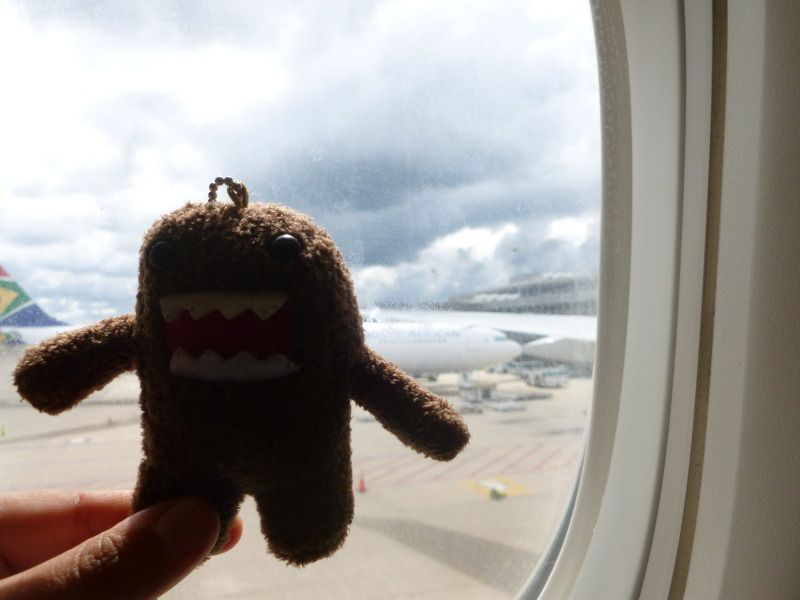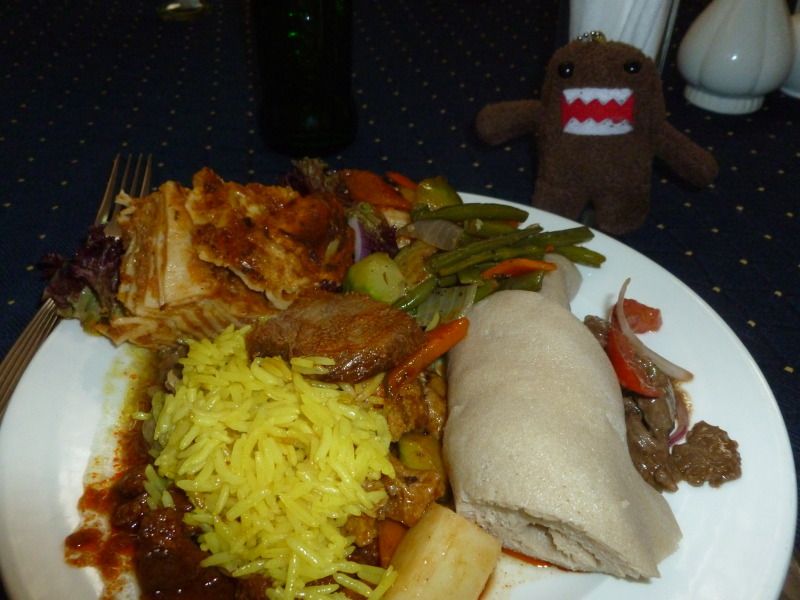Bekoji is a beautiful small rural town in the Ethiopian highlands, about an hour's bus ride outside of Assela. It has many of the same characteristics as other small Ethiopian towns, like Kemise, which I visited a few weeks ago. Because my experience with Ethiopian small towns is limited to Kemise and Bekoji, I am going to compare the two, and add in some things about what I've been told about living as a Peace Corps Volunteer/Trainee in Small Town Ethiopia.
Climate
Bekoji's climate, as I have mentioned previously, is cold. Right now, it's the rainy season, so we get a lot of that, too. But just like Seattle, we have our sun breaks, and it makes the dew on the grass really sparkle and paints the landscape in a golden green haze of awesome. Unlike Seattle, when it rains here, it quite literally pours. Although, like Seattle, it can be sunny and warm in the morning and raining in the afternoon. But it's pretty decisive about it. Unlike Seattle's "Maybe I'll just spit on people today... or breathe on them with my moist foggy breath" attitude.
Bekoji is very much unlike Kemise in this aspect. I visited Kemise after being in the country for only three days, and spent four days in the small, dusty, hot town. Though the people, community, and PCVs there were nothing but warm-hearted and inspiring, I was miserable for the first day or so. My body has issues adjusting to heat and it made me slightly ill. However, after four days, I did get somewhat used to it, and the nights in Kemise were pretty mild. It was just the hot, hot days that made me want to pass out by noon. Additionally, it was not the rainy season in Kemise when I visited. However, other than the climate, Kemise was pretty awesome. I posted photos on my Facebook account - some of you saw - but in case you're not of the privileged few with access to those photos, here's a really awesome tree that grows outside of the market in Kemise. People trade and hold important meetings under this tree.
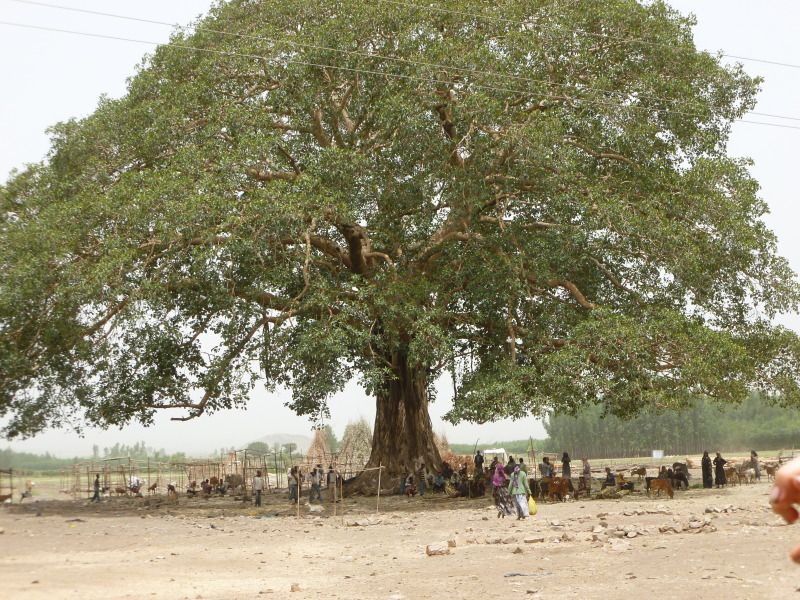
I told you it was awesome. Reminds me of something out of a Disney movie or something. Right? But this photo doesn’t quite capture the heat of Kemise. I wish I had something that did. However, look how dusty and dry the ground is, and how pale it looks. That’s a good thing to contrast with Bekoji, which has a deep red clay-like soil and lots of green grass.
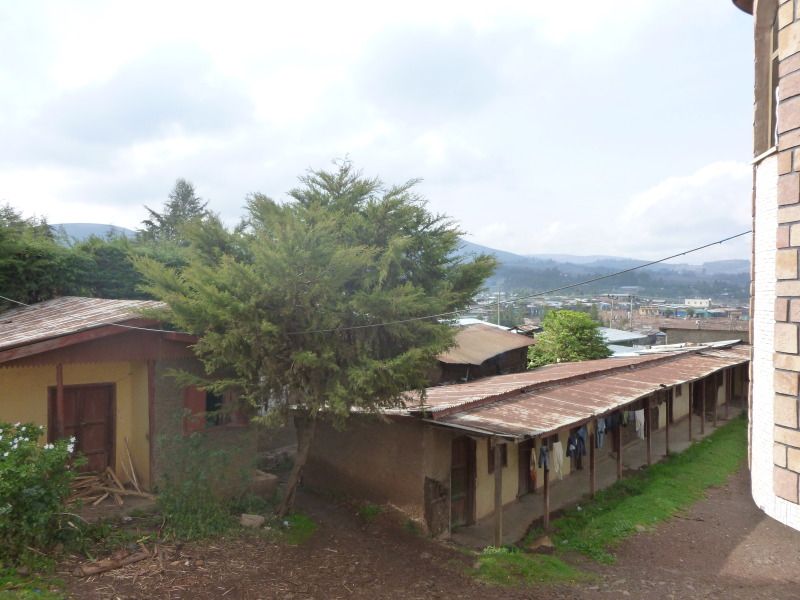
Which just goes to show that Ethiopia is just as diverse geographically and climatologically as, say, the United States. Maybe not as diverse, but it does come close. It has the hottest place on Earth (which, by the way, Peace Corps isn’t allowed to go for other reasons – I’m not complaining!) and it has places with year-round sweater-wearing weather. And this is just in one country. Not all of Africa is savannah and desert and The Lion King, you know.
People
The people in the small towns here in Ethiopia are, as expected, different than they are in the city. Go figure. Just like in Small Town America, people are surprised and curious when a stranger comes to town. And that curiosity can lead to great hospitality, but it can also cause friction sometimes. In Ethiopia, that friction mostly comes from misconceptions about ferengi or foreigners. I told Chelsea on the last post that we get called “China!” a lot, whether we appear Asian or not. Although, admittedly, the Asian American volunteers get it a heck of a lot more often. The most common offenders are a gaggle of children, whose intense curiosity and misinformation about ferengi can border on harassment. You’ll get a lot of “China! China!” of course, but also “Ferengi!” and “Money! Money!” and “Whatisyourname?” (all one word) and “Hellomynameis!” (with no name given). Sometimes, you’ll get some smart alec kid who wants to make a rude gesture at you because he thinks you don’t know what it means. You just gotta yell at him and threaten to go to his father. That scares them off... mostly because they know they’ll get their ears boxed. And I do mean that literally.
But as irritating as they can sometimes be, the curiosity of the children here is also somewhat sweet. Like I said, even the most annoying of comments and actions from the children mostly stem from (mostly) innocent curiosity, and who can blame them for that? We’re new, we’re weird, and we look kind of like the people they’ve seen on TV. Many times, you’ll have kids come up and want to shake your hand, fist bump you, or high-five you, and that’s all they wanted from you. Many grin when you speak to them, in English or Amharic, and are delighted to chat with you in either language. One sweet girl followed us all around Kemise, and at one point slipped her hand into mine and became my buddy. She was only too happy to pose for a portrait for me. Isn’t she beautiful?
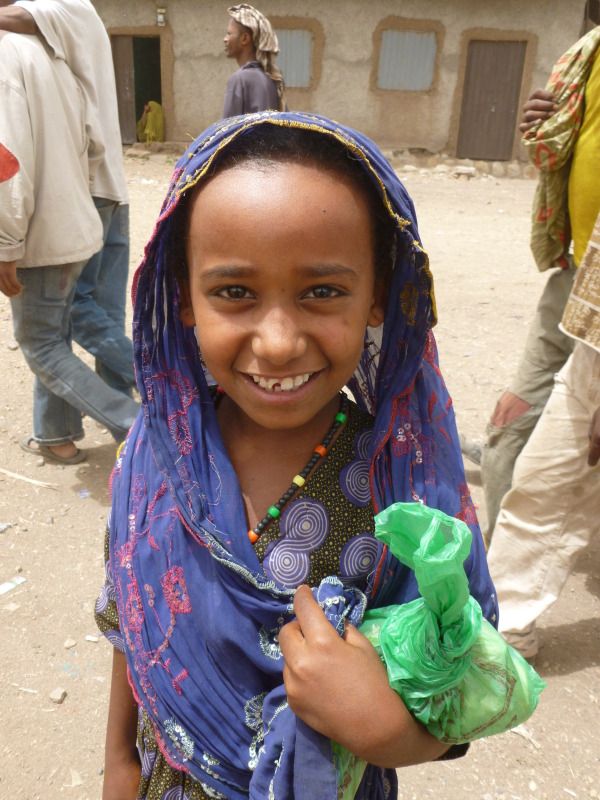
As for the adults, I haven’t encountered one who I have spoken to that has been anything but warm and friendly. Some will stare at you with blank expressions as you go by, but if you greet them, they’ll smile. They’re just not used to ferengi is all. After almost two weeks here now, I still get some stares, but I think people are getting used to our presence here.
Home Life
As I have mentioned before, I live with an incredibly generous host family here in a small compound in Bekoji. A compound consists of a few separate houses around a communal courtyard which generally has animals wandering about. We have a cow, a calf and a goat populating ours. We have electricity, although it goes out on a fairly regular basis (about every other day) for about thirty minutes at a time. Electricity is especially rare if there’s heavy rain. And, of course, there’s not a single wireless signal or Ethernet port anywhere in town, which is why I had to get a portable internet device to even post this update. There is no running water in the compound, but there is a spigot where we can get water when we need it. As a result, I’m bathing about once a week now on Sundays. It’s Friday and I feel really gross. But that’s Peace Corps I guess.
My host mother cooks in a room that they refer to as a kitchen, though it’s not what Americans might think of when they think “kitchen.” The furniture in the room consists of a cabinet, a few benches, a table and some other storage space where she keeps bins and basins for washing dishes and fruits and veggies. She has two stoves – one that burns coals and one that burns propane. They are small things that she uses on the floor as she crouches. When I help peel vegetables, she is shocked that I actually sit on the floor, but it’s more comfortable for me. I can’t crouch for hours like she can. However, in this kitchen, my host mother brews her own shai and buna, and makes tagabino for injera, and whips up a pretty mean scrambled egg. She also makes me pasta relatively frequently, cooked vegetables, potatoes, and this really tasty meat dish that I have no idea what it is. But I put it on dabo and eat it like a sloppy joe. That’s the closest I can relate it too. It’s kind of like a bolognaise sauce, I guess. She makes a lot of magic happen in that kitchen. Check out the awesome meal she made me on my first night here! There’s buna in the kettle, which goes with the popcorn, and injera next to the bread. I think there was tagabino in the pot. Very tasty!
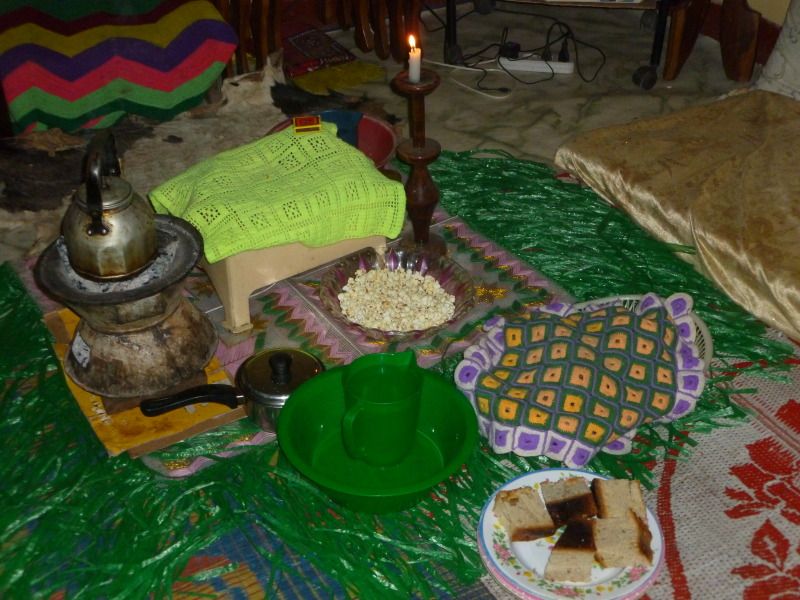
We usually eat in the living room, on cushions on the floor. Sometimes, my host mother will bring out the coal stove to make the buna for our after dinner drink. The television is on about 90% of the time we use that room, even during dinner. Often, it’s tuned to Amharic news, once or twice I’ve seen it on BBC, and my host brother likes to watch American movies a lot, so I’ve also seen those with Arabic subtitles. But most interesting to me is when the channel is tuned to a WWE wrestling match. How they love their wrestling here in Bekoji and, from what I hear, in other rural towns around the country. One PCT in another town told me that a little boy introduced himself to him as John Cena. Another PCT claims that a boy asked him if wrestling was real. Yeah, out of all the crazy American media exports, Ethiopians love wrestling. Go figure.
The Details
I remember Kemise having the smell of dust in the air. Bekoji doesn’t smell anything like that. It’s crisp, because of all the cool rain, and there’s also the smell of soil and animal droppings hanging in the air. There is not a wisp of exhaust to be inhaled anywhere in town, although there are a few cars passing fairly consistently along the main road. It smells like the mountains. In my house, it always smells like food. Popcorn, bread, or the smoky charcoal of the stove, to be more specific, which always brings my mind right back to BBQ.
When it rains, the red soil turns to mud and becomes more clay-like than ever. Literal rivers of rainwater form in the ditches next to the roads, and sometimes even on the roads themselves. I’ve had to hop across a few rainwater rivers on my way home from language class a couple of times now. On Thursday, I stood in the doorway to the courtyard and watched all the rain pound into the mud like bullets. The sound of it was awesome. But even when they sky is gray, it only seems to make the colors of the town stand out all the more. The ground is redder, the grass is greener, the teeth of the shouting children are whiter. I think this photo is a great example of what I mean. Look at all the colors.
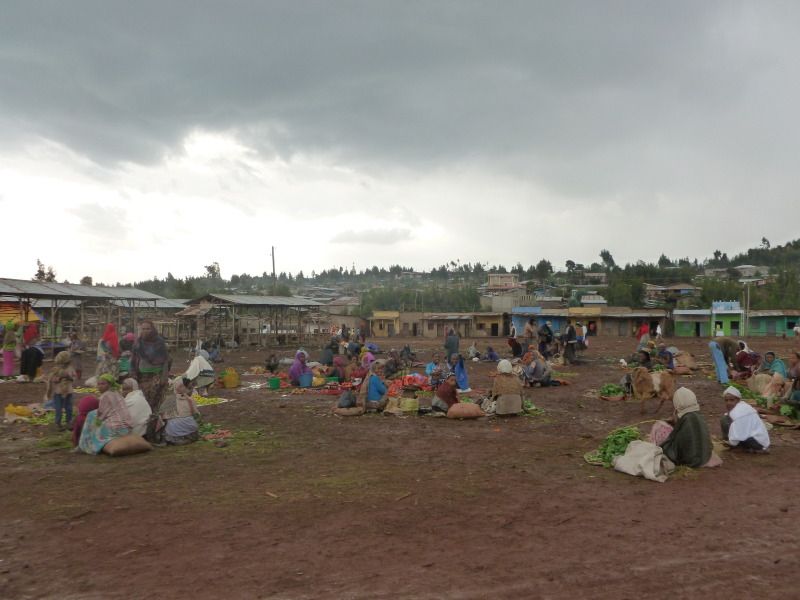
There are all sorts of animals roaming around Bekoji. Cats and dogs, as well as goats, roosters, cows and horses are pretty much everywhere. Which, of course, leads to a cacophony of barnyard sounds night and day. Our cow will, once in a while, let out a roaring mooooo! Just because. As if she’s reminding us that she’s there, in case we forgot. And you’ll definitely hear a rooster at four in the morning waking you up for the call to prayer at five. And some other church somewhere makes noise at around that time, too, with choral responses filtering in through my window. On my way to language class this morning, I heard frogs croaking somewhere, but I’ve yet to see one. Additionally, there’s always music coming from somewhere. Amharic, Arabic, even American music will add to the chorus of sounds. Not to mention the delighted greetings people loudly exchange as they meet old friends (or even acquaintances) in the street, added to the “Whatisyourname?” of the children calling after you as you pass and the clop-clop-clop of a horse and cart rolling down the road in front of you.
Though all of those things make it sound like a noisy place, it really isn’t. Not all of it happens all at once. They weave together in a rhythm that makes the music of the town. In fact, in many ways, it’s much quieter than the city.
Tomorrow, I will go to Assela for some training and I’ll find out where my permanent site placement is. I’ll be sure to keep you posted. You’ll probably notice, also, that I changed the title of this blog (though the URL is still the same – no need to change your bookmarks). It’s now Ferengi No Habesha, and that comes from an old story I heard in Delphi, about the Oracle. When an expectant mother asked about the sex of her child, the Oracle responded “Boy No Girl,” which could be taken “Boy – No, girl,” as in, she misspoke the first time, or “Boy. No girl,” as if she was reiterating. I wanted to do this with Ferngi and Habesha (foreigner versus local) because at times, it’s definitely “She’s a ferengi. Not a Habesha.” But sometimes, I feel it’s more “She’s a ferengi – No, wait, she’s a Habesha” on second glance. Or at least, I’d like that to be, eventually. We’ll see.
Until next time – Dahna hunu!
Climate
Bekoji's climate, as I have mentioned previously, is cold. Right now, it's the rainy season, so we get a lot of that, too. But just like Seattle, we have our sun breaks, and it makes the dew on the grass really sparkle and paints the landscape in a golden green haze of awesome. Unlike Seattle, when it rains here, it quite literally pours. Although, like Seattle, it can be sunny and warm in the morning and raining in the afternoon. But it's pretty decisive about it. Unlike Seattle's "Maybe I'll just spit on people today... or breathe on them with my moist foggy breath" attitude.
Bekoji is very much unlike Kemise in this aspect. I visited Kemise after being in the country for only three days, and spent four days in the small, dusty, hot town. Though the people, community, and PCVs there were nothing but warm-hearted and inspiring, I was miserable for the first day or so. My body has issues adjusting to heat and it made me slightly ill. However, after four days, I did get somewhat used to it, and the nights in Kemise were pretty mild. It was just the hot, hot days that made me want to pass out by noon. Additionally, it was not the rainy season in Kemise when I visited. However, other than the climate, Kemise was pretty awesome. I posted photos on my Facebook account - some of you saw - but in case you're not of the privileged few with access to those photos, here's a really awesome tree that grows outside of the market in Kemise. People trade and hold important meetings under this tree.

I told you it was awesome. Reminds me of something out of a Disney movie or something. Right? But this photo doesn’t quite capture the heat of Kemise. I wish I had something that did. However, look how dusty and dry the ground is, and how pale it looks. That’s a good thing to contrast with Bekoji, which has a deep red clay-like soil and lots of green grass.

Which just goes to show that Ethiopia is just as diverse geographically and climatologically as, say, the United States. Maybe not as diverse, but it does come close. It has the hottest place on Earth (which, by the way, Peace Corps isn’t allowed to go for other reasons – I’m not complaining!) and it has places with year-round sweater-wearing weather. And this is just in one country. Not all of Africa is savannah and desert and The Lion King, you know.
People
The people in the small towns here in Ethiopia are, as expected, different than they are in the city. Go figure. Just like in Small Town America, people are surprised and curious when a stranger comes to town. And that curiosity can lead to great hospitality, but it can also cause friction sometimes. In Ethiopia, that friction mostly comes from misconceptions about ferengi or foreigners. I told Chelsea on the last post that we get called “China!” a lot, whether we appear Asian or not. Although, admittedly, the Asian American volunteers get it a heck of a lot more often. The most common offenders are a gaggle of children, whose intense curiosity and misinformation about ferengi can border on harassment. You’ll get a lot of “China! China!” of course, but also “Ferengi!” and “Money! Money!” and “Whatisyourname?” (all one word) and “Hellomynameis!” (with no name given). Sometimes, you’ll get some smart alec kid who wants to make a rude gesture at you because he thinks you don’t know what it means. You just gotta yell at him and threaten to go to his father. That scares them off... mostly because they know they’ll get their ears boxed. And I do mean that literally.
But as irritating as they can sometimes be, the curiosity of the children here is also somewhat sweet. Like I said, even the most annoying of comments and actions from the children mostly stem from (mostly) innocent curiosity, and who can blame them for that? We’re new, we’re weird, and we look kind of like the people they’ve seen on TV. Many times, you’ll have kids come up and want to shake your hand, fist bump you, or high-five you, and that’s all they wanted from you. Many grin when you speak to them, in English or Amharic, and are delighted to chat with you in either language. One sweet girl followed us all around Kemise, and at one point slipped her hand into mine and became my buddy. She was only too happy to pose for a portrait for me. Isn’t she beautiful?

As for the adults, I haven’t encountered one who I have spoken to that has been anything but warm and friendly. Some will stare at you with blank expressions as you go by, but if you greet them, they’ll smile. They’re just not used to ferengi is all. After almost two weeks here now, I still get some stares, but I think people are getting used to our presence here.
Home Life
As I have mentioned before, I live with an incredibly generous host family here in a small compound in Bekoji. A compound consists of a few separate houses around a communal courtyard which generally has animals wandering about. We have a cow, a calf and a goat populating ours. We have electricity, although it goes out on a fairly regular basis (about every other day) for about thirty minutes at a time. Electricity is especially rare if there’s heavy rain. And, of course, there’s not a single wireless signal or Ethernet port anywhere in town, which is why I had to get a portable internet device to even post this update. There is no running water in the compound, but there is a spigot where we can get water when we need it. As a result, I’m bathing about once a week now on Sundays. It’s Friday and I feel really gross. But that’s Peace Corps I guess.
My host mother cooks in a room that they refer to as a kitchen, though it’s not what Americans might think of when they think “kitchen.” The furniture in the room consists of a cabinet, a few benches, a table and some other storage space where she keeps bins and basins for washing dishes and fruits and veggies. She has two stoves – one that burns coals and one that burns propane. They are small things that she uses on the floor as she crouches. When I help peel vegetables, she is shocked that I actually sit on the floor, but it’s more comfortable for me. I can’t crouch for hours like she can. However, in this kitchen, my host mother brews her own shai and buna, and makes tagabino for injera, and whips up a pretty mean scrambled egg. She also makes me pasta relatively frequently, cooked vegetables, potatoes, and this really tasty meat dish that I have no idea what it is. But I put it on dabo and eat it like a sloppy joe. That’s the closest I can relate it too. It’s kind of like a bolognaise sauce, I guess. She makes a lot of magic happen in that kitchen. Check out the awesome meal she made me on my first night here! There’s buna in the kettle, which goes with the popcorn, and injera next to the bread. I think there was tagabino in the pot. Very tasty!

We usually eat in the living room, on cushions on the floor. Sometimes, my host mother will bring out the coal stove to make the buna for our after dinner drink. The television is on about 90% of the time we use that room, even during dinner. Often, it’s tuned to Amharic news, once or twice I’ve seen it on BBC, and my host brother likes to watch American movies a lot, so I’ve also seen those with Arabic subtitles. But most interesting to me is when the channel is tuned to a WWE wrestling match. How they love their wrestling here in Bekoji and, from what I hear, in other rural towns around the country. One PCT in another town told me that a little boy introduced himself to him as John Cena. Another PCT claims that a boy asked him if wrestling was real. Yeah, out of all the crazy American media exports, Ethiopians love wrestling. Go figure.
The Details
I remember Kemise having the smell of dust in the air. Bekoji doesn’t smell anything like that. It’s crisp, because of all the cool rain, and there’s also the smell of soil and animal droppings hanging in the air. There is not a wisp of exhaust to be inhaled anywhere in town, although there are a few cars passing fairly consistently along the main road. It smells like the mountains. In my house, it always smells like food. Popcorn, bread, or the smoky charcoal of the stove, to be more specific, which always brings my mind right back to BBQ.
When it rains, the red soil turns to mud and becomes more clay-like than ever. Literal rivers of rainwater form in the ditches next to the roads, and sometimes even on the roads themselves. I’ve had to hop across a few rainwater rivers on my way home from language class a couple of times now. On Thursday, I stood in the doorway to the courtyard and watched all the rain pound into the mud like bullets. The sound of it was awesome. But even when they sky is gray, it only seems to make the colors of the town stand out all the more. The ground is redder, the grass is greener, the teeth of the shouting children are whiter. I think this photo is a great example of what I mean. Look at all the colors.

There are all sorts of animals roaming around Bekoji. Cats and dogs, as well as goats, roosters, cows and horses are pretty much everywhere. Which, of course, leads to a cacophony of barnyard sounds night and day. Our cow will, once in a while, let out a roaring mooooo! Just because. As if she’s reminding us that she’s there, in case we forgot. And you’ll definitely hear a rooster at four in the morning waking you up for the call to prayer at five. And some other church somewhere makes noise at around that time, too, with choral responses filtering in through my window. On my way to language class this morning, I heard frogs croaking somewhere, but I’ve yet to see one. Additionally, there’s always music coming from somewhere. Amharic, Arabic, even American music will add to the chorus of sounds. Not to mention the delighted greetings people loudly exchange as they meet old friends (or even acquaintances) in the street, added to the “Whatisyourname?” of the children calling after you as you pass and the clop-clop-clop of a horse and cart rolling down the road in front of you.
Though all of those things make it sound like a noisy place, it really isn’t. Not all of it happens all at once. They weave together in a rhythm that makes the music of the town. In fact, in many ways, it’s much quieter than the city.
Tomorrow, I will go to Assela for some training and I’ll find out where my permanent site placement is. I’ll be sure to keep you posted. You’ll probably notice, also, that I changed the title of this blog (though the URL is still the same – no need to change your bookmarks). It’s now Ferengi No Habesha, and that comes from an old story I heard in Delphi, about the Oracle. When an expectant mother asked about the sex of her child, the Oracle responded “Boy No Girl,” which could be taken “Boy – No, girl,” as in, she misspoke the first time, or “Boy. No girl,” as if she was reiterating. I wanted to do this with Ferngi and Habesha (foreigner versus local) because at times, it’s definitely “She’s a ferengi. Not a Habesha.” But sometimes, I feel it’s more “She’s a ferengi – No, wait, she’s a Habesha” on second glance. Or at least, I’d like that to be, eventually. We’ll see.
Until next time – Dahna hunu!
